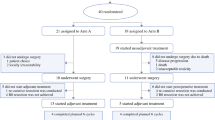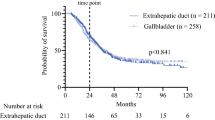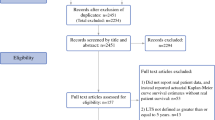Abstract
Background
The MAGIC trial has shown perioperative chemotherapy does significantly improve overall survival of patients with gastric and esophagogastric junction carcinoma. The approach to evaluate the effectiveness of adjuvant chemotherapy is urgent in clinical practice.
Methods
Totally, 264 patients with locally advanced gastric carcinoma (including esophagogastric junction carcinoma) treaded by perioperiate chemotherapy (SOX or XELOX) from May 2012 to December 2017 in our cancer center were included. Tumor response was evaluated by tumor regression grade (TRG, Mandard system) and Response Evaluation Criteria in Solid Tumor (RECIST v1.1). The clinical characteristics and the effect on survival were analyzed.
Result
Univariate analysis showed TRG was correlated to tumor size, Lauren classification, grade of differentiation, histological type, postsurgical T category (ypT), postsurgical N category (ypN), vascular invasion or lymphatic invasion and so on. However, only Lauren classification and ypT were independent factors for TRG. On contrary to RECIST, TRG was founded to be a prognostic factor for DFS and OS on univariate analysis. Cox proportional hazards were established to evaluate the relationship among TRG, clinical-pathological factors and survival. On multivariate analysis, the chemotherapy cycle, Lauren classification, vascular invasion or lymphatic invasion, ypN and postsurgical pathologic stage were independent factors for OS and DFS, while TRG were negatively correlated to survival.
Conclusion
TRG seems to be a promising prognostic indicator and it predicts the prognosis of patients with locally advanced gastric cancer after adjuvant chemotherapy more reasonably in comparisons to RECIST v1.1.




Similar content being viewed by others
References
Jemal A, Siegel R, Xu J, Ward E (2010) Cancer statistics, 2010. CA Cancer J Clin 60:277–300. https://doi.org/10.3322/caac.20073
Liu YY, Fang WL, Wang F et al (2017) Does a higher cutoff value of lymph node retrieval substantially improve survival in patients with advanced gastric cancer?-Time to embrace a new digit. Oncologist 22:97–106. https://doi.org/10.1634/theoncologist.2016-0239
Smyth EC, Fassan M, Cunningham D et al (2016) Effect of pathologic tumor response and nodal status on survival in the medical research council adjuvant gastric infusional chemotherapy trial. J Clin Oncol 34:2721–2727. https://doi.org/10.1200/JCO.2015.65.7692
Giampieri R, Del PM, Cantini L, Baleani MG, Bittoni A, Maccaroni E, Berardi R (2018) Optimal management of resected gastric cancer. Cancer Manag Res 10:1605–1618. https://doi.org/10.2147/CMAR.S151552
Cunningham D, Allum WH, Stenning SP et al (2006) Perioperative chemotherapy versus surgery alone for resectable gastroesophageal cancer. N Engl J Med 355:11–20. https://doi.org/10.1056/NEJMoa055531
van Hagen P, Hulshof MC, van Lanschot JJ et al (2012) Preoperative chemoradiotherapy for esophageal or junctional cancer. N Engl J Med 366:2074–2084. https://doi.org/10.1056/NEJMoa1112088
Mandard AM, Dalibard F, Mandard JC, Marnay J, Henry-Amar M, Petiot JF, Roussel A, Jacob JH, Segol P, Samama G (1994) Pathologic assessment of tumor regression after preoperative chemoradiotherapy of esophageal carcinoma Clinicopathol correlations. Cancer 73:2680–2686
Japanese Gastric Cancer Association (2011) Japanese classification of gastric carcinoma: 3rd English edition. Gastric Cancer 14:101–112. https://doi.org/10.1007/s10120-011-0041-5
Becker K, Mueller JD, Schulmacher C, Ott K, Fink U, Busch R, Böttcher K, Siewert JR, Höfler H (2003) Histomorphology and grading of regression in gastric carcinoma treated with neoadjuvant chemotherapy. Cancer 98:1521–1530. https://doi.org/10.1002/cncr.11660
Rödel C, Martus P, Papadoupolos T et al (2005) Prognostic significance of tumor regression after preoperative chemoradiotherapy for rectal cancer. J Clin Oncol 23:8688–8696. https://doi.org/10.1200/JCO.2005.02.1329
Wang FH, Shen L, Li J et al (2019) The Chinese Society of Clinical Oncology (CSCO): clinical guidelines for the diagnosis and treatment of gastric cancer. Cancer Commun (Lond) 39:10. https://doi.org/10.1186/s40880-019-0349-9
Li T, Chen L (2011) Efficacy and safety of SOX regimen as neoadjuvant chemotherapy for advanced gastric cancer. Zhonghua Wei Chang Wai Ke Za Zhi 14:104–106
Cunningham D, Okines AF, Ashley S (2010) Capecitabine and oxaliplatin for advanced esophagogastric cancer. N Engl J Med 362:858–859. https://doi.org/10.1056/NEJMc0911925
Ychou M, Boige V, Pignon JP et al (2011) Perioperative chemotherapy compared with surgery alone for resectable gastroesophageal adenocarcinoma: an FNCLCC and FFCD multicenter phase III trial. J Clin Oncol 29:1715–1721. https://doi.org/10.1200/JCO.2010.33.0597
Bang YJ, Kim YW, Yang HK et al (2012) Adjuvant capecitabine and oxaliplatin for gastric cancer after D2 gastrectomy (CLASSIC): a phase 3 open-label, randomised controlled trial. Lancet 379:315–321. https://doi.org/10.1016/S0140-6736(11)61873-4
Eisenhauer EA, Therasse P, Bogaerts J et al (2009) New response evaluation criteria in solid tumours: revised RECIST guideline (version 1.1). Eur J Cancer 45:228–247. https://doi.org/10.1016/j.ejca.2008.10.026
Nakata B, Chung KH, Muguruma K, Yamashita Y, Inoue T, Matsuoka T, Onoda N, Kato Y, Sakurai M, Sowa M (1998) Changes in tumor marker levels as a predictor of chemotherapeutic effect in patients with gastric carcinoma. Cancer 83:19–24
Robb WB, Mariette C (2012) Predicting the response to chemotherapy in gastric adenocarcinoma: who benefits from neoadjuvant chemotherapy. Recent Results Cancer Res 196:241–268. https://doi.org/10.1007/978-3-642-31629-6_17
Bain GH, Collie-Duguid E, Murray GI et al (2014) Tumour expression of leptin is associated with chemotherapy resistance and therapy-independent prognosis in gastro-oesophageal adenocarcinomas. Br J Cancer 110:1525–1534. https://doi.org/10.1038/bjc.2014.45
Zhu Y, Sun Y, Hu S, Jiang Y, Yue J, Xue X, Yang L, Xue L (2017) Comparison of five tumor regression grading systems for gastric adenocarcinoma after neoadjuvant chemotherapy: a retrospective study of 192 cases from National Cancer Center in China. BMC Gastroenterol 17:41. https://doi.org/10.1186/s12876-017-0598-5
Tomasello G, Petrelli F, Ghidini M, Pezzica E, Passalacqua R, Steccanella F, Turati L, Sgroi G, Barni S (2017) Tumor regression grade and survival after neoadjuvant treatment in gastro-esophageal cancer: a meta-analysis of 17 published studies. Eur J Surg Oncol 43:1607–1616. https://doi.org/10.1016/j.ejso.2017.03.001
Schmidt T, Sicic L, Blank S et al (2014) Prognostic value of histopathological regression in 850 neoadjuvantly treated oesophagogastric adenocarcinomas. Br J Cancer 110:1712–1720. https://doi.org/10.1038/bjc.2014.94
Achilli P, De Martini P, Ceresoli M, Mari GM, Costanzi A, Maggioni D, Pugliese R, Ferrari G (2017) Tumor response evaluation after neoadjuvant chemotherapy in locally advanced gastric adenocarcinoma: a prospective, multi-center cohort study. J Gastrointest Oncol 8:1018–1025. https://doi.org/10.21037/jgo.2017.08.13
Park SR, Lee JS, Kim CG, Kim HK, Kook MC, Kim YW, Ryu KW, Lee JH, Bae JM, Choi IJ (2008) Endoscopic ultrasound and computed tomography in restaging and predicting prognosis after neoadjuvant chemotherapy in patients with locally advanced gastric cancer. Cancer 112:2368–2376. https://doi.org/10.1002/cncr.23483
Neves FEH, de Sant’Ana RO, Nunes LV, Pires AP, da Cunha MD (2017) Histopathological regression of gastric adenocarcinoma after neoadjuvant therapy: a critical review. APMIS 125:79–84. https://doi.org/10.1111/apm.12642
Yoshikawa T, Tanabe K, Nishikawa K et al (2014) Accuracy of CT staging of locally advanced gastric cancer after neoadjuvant chemotherapy: cohort evaluation within a randomized phase II study. Ann Surg Oncol 21(Suppl 3):S385–S389. https://doi.org/10.1245/s10434-014-3615-8
Kurokawa Y, Shibata T, Sasako M, Sano T, Tsuburaya A, Iwasaki Y, Fukuda H (2014) Validity of response assessment criteria in neoadjuvant chemotherapy for gastric cancer (JCOG0507-A). Gastric Cancer 17:514–521. https://doi.org/10.1007/s10120-013-0294-2
Zu H, Wang H, Li C, Xue Y (2014) Clinicopathologic characteristics and prognostic value of various histological types in advanced gastric cancer. Int J Clin Exp Pathol 7:5692–5700
Novotny AR, Schuhmacher C, Busch R, Kattan MW, Brennan MF, Siewert JR (2006) Predicting individual survival after gastric cancer resection: validation of a U.S.-derived nomogram at a single high-volume center in Europe. Ann Surg 243:74–81
Ikoma Naruhiko, Hofstetter Wayne L, Estrella Jeannelyn S, Das Prajnan, Minsky Bruce D, Fournier Keith F, Mansfield Paul F, Ajani Jaffer A, Badgwell Brian D (2018) The ypT category does not impact overall survival in node negative gastric cancer. J Surg Oncol 117(8):1721–1728. https://doi.org/10.1002/jso.25081
Author information
Authors and Affiliations
Contributions
Xing Xu searched and reviewed the literature, designed the research and wrote the paper. Guoliang Zheng designed the research and provided the clinical data. Yan Zhao performed statistical analysis. Tao Zhang reviewed the literature and interpreted the paper. Zhichao Zheng participated in reviewing the literature, designing the research, revising and writing the paper.
Corresponding author
Ethics declarations
Conflict of interest
The authors declare that they have no conflict of interest
Ethical approval
This study was approved by the Ethics Committee of Liao Ning Cancer Hospital.
Additional information
Publisher's Note
Springer Nature remains neutral with regard to jurisdictional claims in published maps and institutional affiliations.
Rights and permissions
About this article
Cite this article
Xu, X., Zheng, G., Zhang, T. et al. Is pathologic tumor regression grade after neo-adjuvant chemotherapy a promising prognostic indicator for patients with locally advanced gastric cancer? A cohort study evaluating tumor regression response. Cancer Chemother Pharmacol 84, 635–646 (2019). https://doi.org/10.1007/s00280-019-03893-4
Received:
Accepted:
Published:
Issue Date:
DOI: https://doi.org/10.1007/s00280-019-03893-4




